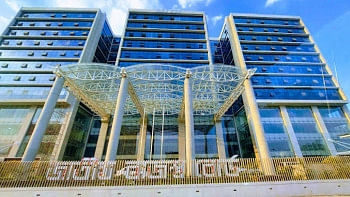Combating deepfakes in Bangladesh: legislation to public empowerment

Bangladesh's recent enactment of the Cyber Security Ordinance 2025 marks a pivotal moment in the nation's ongoing efforts to secure its digital ecosystem. This ordinance, which follows the contentious Cyber Security Act of 2023, promises a more balanced and rights-conscious approach. Significantly, it includes provisions criminalising cybercrimes involving artificial intelligence (AI)—a first for South Asia, and a necessary step given the escalating misuse of such technologies.
However, legislation alone is not enough to address the broader challenges posed by AI, particularly the rise of deepfakes. These hyper-realistic, AI-generated audio and video forgeries can convincingly mimic individuals, spreading falsehoods with alarming ease. Having already influenced elections and public perception in countries like the United States and Canada, deepfakes are now proliferating in Bangladesh—most notably in the wake of recent political transitions.
In recent months, digitally manipulated content targeting politicians and media personalities has gained traction, outpacing the ability of traditional fact-checking mechanisms to debunk it. A few days ago, Faiz Ahmad Taiyeb, special assistant to the chief adviser for the ICT Ministry, issued a stark warning: coordinated cyberattacks and disinformation campaigns are intensifying as the country approaches another critical election cycle. His remarks underscore how fragile democratic processes have become in the age of digital manipulation.
The accessibility of deepfake technology compounds the threat. No longer confined to experts, these tools are now within reach of the average internet user. A joint investigation by CBC News, Bellingcat, and Danish media recently revealed that David Do, a Canadian hospital pharmacist, operated MrDeepFakes.com—the world's largest platform for non-consensual deepfake pornography. This case demonstrates how individuals, with minimal technical expertise, can inflict real harm on both public figures and private citizens. Despite the gravity, many countries, including Canada, lack specific laws to address the creation and distribution of such content.
What makes deepfakes particularly dangerous is their ability to hijack human emotion. Ongoing research at Concordia University in Canada suggests that these manipulations succeed not because people are gullible, but because they evoke strong emotional responses that override critical thinking.
Given this, Bangladesh must adopt a two-pronged strategy: strengthening legal frameworks while investing in public empowerment and education. A resilient digital society cannot be built through legislation alone. People must be equipped with the knowledge and tools to recognise and respond to misinformation.
This means integrating digital literacy into the national curriculum. Students should learn how to identify manipulated media, understand the mechanics behind deepfakes, and practise responsible online behaviour.
Public awareness campaigns, led by government agencies, NGOs and media outlets, are also essential. These should demystify AI technologies, highlight the risks they pose, and explain the value of fact-checking. Delivery should be multi-platform—television, radio, newspapers and social media—to ensure wide reach.
Bangladesh can also tap into its youth. By training young volunteers as digital literacy ambassadors, communities can receive peer-led education on online safety. These efforts could be particularly effective in rural and underserved areas where misinformation often goes unchecked.
Meanwhile, collaboration between universities and tech companies should be encouraged to develop and deploy AI-driven deepfake detection tools tailored to local platforms. Journalists and influencers, too, need training in content verification, enabling them to serve as credible sources for their audiences.
AI is a double-edged sword. It can deceive, but it can also defend. Tools to detect manipulated content already exist, but their success hinges on public awareness and use. Ultimately, the strongest defence against digital misinformation is not just technological—it is social.
Empowering citizens through education is not optional; it is indispensable. By fostering digital resilience and critical thinking—especially among the young—Bangladesh can safeguard not only the integrity of its elections but the health of its democracy.
Azfar Adib is a digital safety activist and a PhD candidate at Concordia University in Canada. He can be reached at [email protected].

 For all latest news, follow The Daily Star's Google News channel.
For all latest news, follow The Daily Star's Google News channel. 



Comments